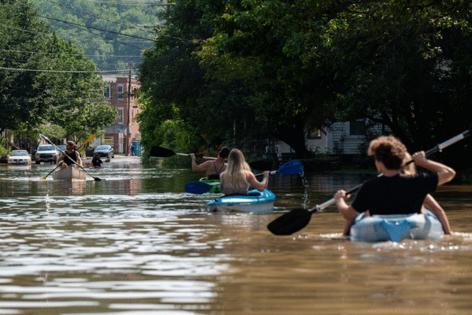Lawmakers hope to use this emerging climate science to charge oil companies for disasters
Published in News & Features
A fast-emerging field of climate research is helping scientists pinpoint just how many dollars from a natural disaster can be tied to the historic emissions of individual oil companies — analysis that is the centerpiece of new state efforts to make fossil fuel companies pay billions for floods, wildfires and heat waves.
When a flood or wildfire hits, researchers in “attribution science” run computer models to help determine whether the disaster was caused or intensified by climate change.
As those models become more precise, other scientists are working to measure how specific companies, such as Exxon Mobil or Shell, have contributed to climate change through their historic greenhouse gas emissions.
“This is a growing field, and it’s a game changer for addressing climate change,” said Delta Merner, the lead scientist for the Science Hub for Climate Litigation at the Union of Concerned Scientists, a climate-focused research and advocacy nonprofit. “It has a role to play in litigation and in policy, because it gives us that precision.”
For the first time, some state lawmakers are trying to turn that advanced modeling into policy. Under their proposals, state agencies would use attribution science to tally up the damages caused by climate change and identify the companies responsible. Then, they would send each company a bill for its portion of the destruction, from heat waves to hurricanes.
“This science is evolving rapidly,” said Anthony Iarrapino, a Vermont-based attorney and lobbyist for the Conservation Law Foundation who has been a leading advocate for attribution-based policy. “This is something that couldn’t have been done 10 years ago. [Lawmakers] are benefiting from this shift in focus among some of the most talented scientists we have out there.”
Lawmakers in Vermont and four other blue states have proposed “climate Superfund” bills, which would create funds to pay for recovery from climate disasters and preparation for sea level rise and other adaptation measures.
Oil and coal companies would pay into those funds based on the percentage of emissions they’ve caused over a set period. The legislation’s name references the 1980 federal Superfund law that forces polluters to pay for the cleanup of toxic waste sites.
States’ climate proposals come after years of lawsuits by state attorneys general against many of those same companies. They claim the companies knew years ago that fossil fuel use was causing climate change, but misled the public about that danger. While the courtroom fights are far from resolved, some advocates think it’s time for lawmakers to get involved.
“There have been a lot of lawsuits trying to get these companies to pay for some damages, and the industry’s message has been, ‘This is a task for legislatures, not the courts,’” said Justin Flagg, director of environmental policy for New York state Sen. Liz Krueger, a Democrat. “We are taking up that invitation.”
...continued
©2024 States Newsroom. Visit at stateline.org. Distributed by Tribune Content Agency, LLC.







Comments